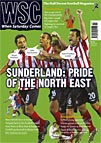 With the current laws preventing independently run sites from showing clubs fixture lists it looks unlikely to change any time soon. Dave Lee reports
With the current laws preventing independently run sites from showing clubs fixture lists it looks unlikely to change any time soon. Dave Lee reports
WSC 226 told the story of Watford fanzine Blind, Stupid and Desperate who had their website temporarily taken offline after they listed an upcoming fixture against Leicester City. Four years on, the debate about rights over football fixtures is still red hot. In one corner: Football DataCo, the company responsible for managing licences for the use of football fixtures in print and online. As well as collecting money, DataCo will routinely seek out websites which flaunt these rules. In the other, more crowded corner: the press and football fans.
Imagine you support Scunthorpe and, delighted by promotion, you start a website. No problem – just be sure to have your wallet at the ready. According to their website, DataCo will charge you £266 plus VAT for Scunthorpe’s fixtures. Just Scunthorpe’s. If you wanted to display other fixtures from the same league, you’re looking at £4,244 plus VAT. Although, if you’re the club’s nominated fanzine, you only have to pay a mere £1. But as Blind, Stupid and Desperate found, rarely will a club only have one fan-run publication – especially in the times of web boom.
DataCo claim that without “protecting” their data, clubs could lose big money. Income from fixtures is divided around the leagues, with the majority, in the region of 50 per cent, going to teams in the Football League. They argue that if they weren’t so heavy-handed, clubs would stand to lose ten per cent of their annual distributable income. When put in those terms, protection of fixtures seems like a worthy, even noble, cause. But that defence relies on a crucial factor: do threatened fanzines and websites actually end up paying? The answer appears to be “no”.
Former newspaper journalist Rick Wag-horn runs MyFootballWriter, an East Anglia-based fan site dealing with Norwich City, Ipswich Town and Colchester United. Waghorn, a Norwich fan, simply refuses to pay. “It’s very simple,” he says. “I’m not paying the prices they charge. If it was free, I’d take them… but once people start protecting their ‘data’ and expecting a fee, I’m out of there.” Many other fanzines and sites follow Waghorn’s logic. Rather than, as DataCo might have hoped, stump up the cash for a licence, fans are opting to simply make do without. And it’s not just small-time publications that are irked. In 2001, the Daily Telegraph’s Nick Spencer wrote a stinging attack on DataCo, calling them “a company formed jointly by the leagues whose purpose, on the face of it, is to extract as much money as possible for the information, and from internet companies in particular”. Under DataCo’s tariffs, posting fixtures online costs “many times the fee” of printing them in the newspaper. Incredibly, DataCo have tried to gain a share of advertising revenue from any articles that used fixtures for a single team as a discussion point.
In the summer of 2008, the Newspaper Publishers Association threatened a fixture blackout unless DataCo cut a fairer deal. This action was avoided following last minute crisis talks between the groups. The terms of the agreement are unclear, but fixtures appeared, as planned, in the press that Monday. More recently, DataCo have turned their efforts to micro-blogging service Twitter. FootyTweets, run by web developer Ollie Parsley, used to “tweet” live match updates. It was, Parsley says, an entirely non-profit endeavour. Now, Parsley has been forced to stop posting updates unless he purchases a licence costing thousands upon thousands of pounds. DataCo would argue they are protecting revenue. Intriguingly, NetResult – the firm acting on behalf of DataCo to chase down “illegal” use of fixtures – cited FootyTweet’s apparent buy-out by BSkyB as proof that friendly non-profits can become commercial entities. An interesting view, especially considering the buy-out was an April Fool’s joke.
Meanwhile, Parsley runs CricketTweets, RugbyTweets and MotorTweets with no such interference. Next year’s fixtures are imminent. So too is the annual tussle over rights. In 2005, WSC concluded that it was “inherently nonsensical”. Four years on, little has changed. Like so many things in football, the fans bear the brunt of corporate greed,
From WSC 269 July 2009